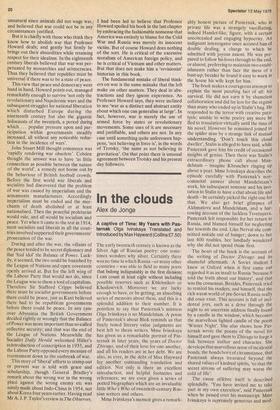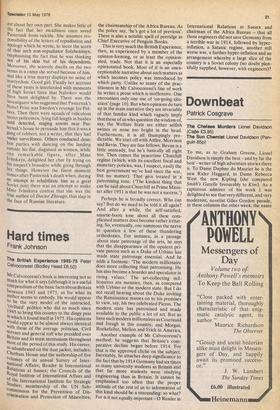In the clouds
Alex de Jonge
A captive of Time: My Years with Pasternak Olga IvInskaya Translated and Introduced by Max Hayward (Collins £7.50) The early twentieth century is known as the Silver Age of Russian poetry: one sometimes wonders why silver. Certainly there was no time in which Russia —or many other countries — was able to field so many poets that belong indisputably in the first division; I. can count at least eight without including possible reserves such as Khlebnikov or Khodasevich. Moreover we are lucky enough to have, or be getting, an absorbing series of memoirs about them, and this is a splendid addition to their number. It is pointless to say that Pasternak's mistress Olga Ivinskaya is no Mandelstam. A poem of Pasternak's about Blok reminds us that finely tuned literary value judgments are best left to thesis writers. Mme Ivinskaya has given us a remarkable portrait of Pasternak in later years, the years of Doctor Zhivago, and of their love for one another, and all his readers are in her debt. We are also, as ever, in the debt of Max Hayward for another outstanding translation and edition. Not only is there an excellent introduction, and helpful footnotes and references; we are even given a series of potted biographies which are an invaluable little Who's Who of twentieth-century Russian writers and others.
Mme Ivinskaya's memoir gives a remark
ably honest picture of Pasternak, who in private life was a strangely vaccinating, indeed Hamlet-like, figure, with a certain unconcealed and engaging hypocrisy. An indignant interrogator once accused him of double dealing, a charge to which he admitted with joyous assent. He was prepared to follow his loves through to the end, or almost, preferring to maintain two establishments rather than face the mess of a bust-up; besides he found it easy to work in the house his wife kept for him.
The book makes a courageous attempt to explain the most puzzling fact of all: his survival. He did not earn it by shameless collaboration and did far less for the regime than many who ended up in Stalin's bag. He responded to the terror with creative paralysis; unable to write poetry any more he fled to translation virtually until the time of his novel. However he remained joined to the spider man by a strange link of mutual understanding. 'Don't touch this cloud dweller', Stalin is alleged to have said, while Pasternak gave him his credit of occasional insights of genius. Then there was Stalin's extraordinary phone call about Mandelstam — imagine K hruschev ringing up about a poet. Mme Ivinskaya describes the episode carefully with Pasternak's noncommital answer about Mandelstam's work, his subsequent remorse and his invitation to Stalin to have a chat about life and death — he certainly picked the right one for that. We also get brief glimpses of Akhmatova and Mandelstam, and a harrowing account of the luckless Tsvetayava. Pasternak felt responsible for her return to Russia, and blamed himself for neglecting her towards the end. Like Nerval she committed suicide out of hunger; down to her last 400 roubles, her landlady wondered why she did not spend those first.
The heart of the book is the account of the writing of Doctor Zhivago and its shameful aftermath. A Soviet student I knew at Oxford when it first came out regarded it as an insult to Russia 'because it told the truth about our history', and that was the consensus. Besides, Pasternak tried to remind his readers, and himself, that the rich warm world of pre-Soviet Russia really did once exist. This account is full of incidental joys, such as a drive through the night to an uncertain address finally found by a candle in the window, which becomes the marvellous lighted candle of the poem 'Winter Night'. She also shows how Pas ternak wrote the poems of the novel for himself and gave them to Zhivago to forge a link between author and character. She develops that marvellous sense of incidental bonds, the bonds born of circumstance, that Pasternak always treasured beyond the shared values of kindred spirits, `so that the secret stream of suffering may warm the cold of life'.
The cause célèbre itself is described splendidly. 'You have invited me to take part in my own execution', said Pasternak when he passed over his manuscript. Mme Ivinskaya is supremely generous and mod
est about her own part. She makes little of the fact that her steadiness once saved Pasternak from suicide. She assumes responsibility of the letters of repudiation and apology which he wrote, to incur the scorn of that arch non-repudiator Solzhenitsyn, emphasising the fact that he was thinking not of his skin but of his dependents. Moreover, she scarcely dwells on the two terms in a camp she served because of him, and like a true martyr displays no sense of martyrdom. Good girl. Finally her account of these years is interlarded with moments of high Soviet farce that Nabokov would have been delighted by. There was the Investigator who suggested that Pasternak's Nobel Prize was Sweden's revenge for Poltava. Then there were squads of ridiculous secret policemen, lying full length in bushes until detected, staging arrests near Pasternak's house to persuade him that it was a gang of robbers, not a writer, that they had under surveillance. Others conducted drunken parties with dancing on the landing outside his flat, disguised as women, while one remarkable figure, after Mme Ivinskaya, delighted her char by trying on his suspect's brassiere while going through her things: However the finest moment
comes after Pasternak's death when, during an attempt to rehabilitate him as a great
Soviet poet there was an attempt to make Mme lvinskaya confess that she was the true author of Doctor Zhivago, that slap in the face of Russian literature.



































 Previous page
Previous page